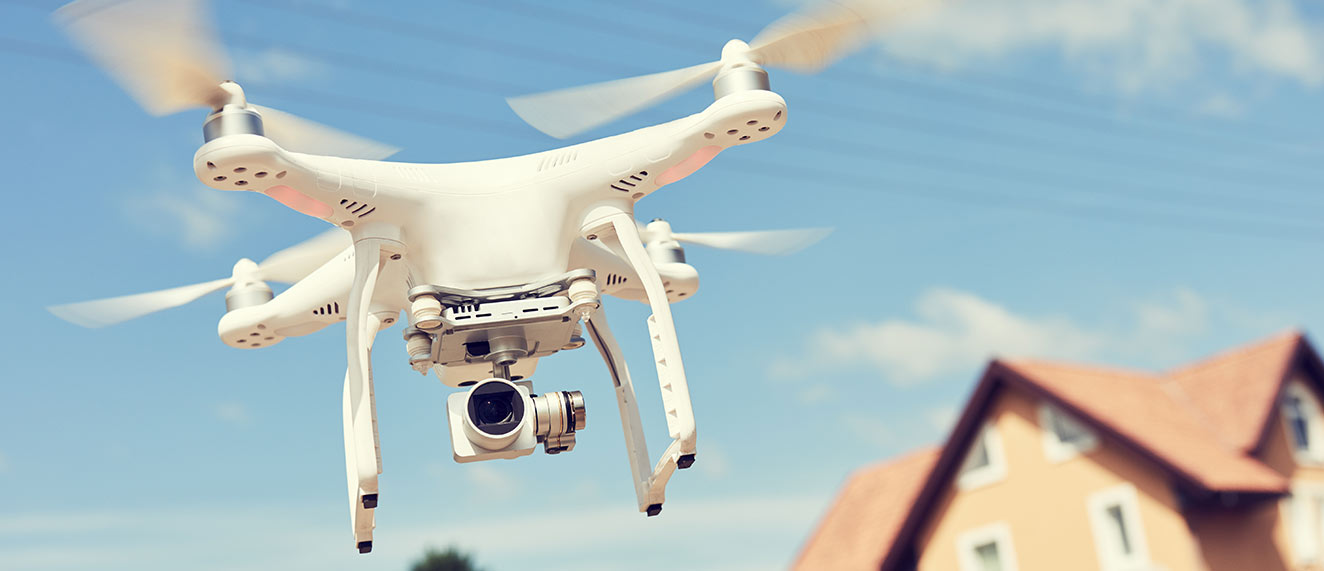Before taking your listing to new heights you may want to familiarize yourself with Canada’s new drone regulations.
While still in its infancy, drone technology is being used to assist with farming, disaster relief, mineral exploration, land surveillance, mail delivery and more.
Drones are also used in real estate. The technology offers a relatively inexpensive way to get stunning, rarely-seen aerial footage of everything from high-rise buildings to rural farmland, and everything in between.
However, REALTORS® using drone photography to showcase their listings need to be aware of new rules and regulations from Transport Canada which came into effect on Saturday, June 1, 2019. The rules apply to all drones operated within visual-line-of-sight, weighing between 250 grams and 25 kilograms, which are flown for any purpose—fun, work or research (there are exceptions outside of this, including microdrones and drones weighing more than 25 kilograms). The new regulations were created to eliminate the need for most Special Flight Operations Certificates (SFOCs), however they may still be required for certain more complex operations.
The new regulations are broken down into two categories, basic operations and advanced operations, each with its own set of rules to follow. REALTORS® should familiarize themselves with both categories because the regulations are based on the weight of your drone, distance from bystanders outside in the public and airspace rules.
If you meet all the following conditions, you are conducting basic operations:
- Your drone weighs between 250 grams and 25 kilograms;
- You intend to fly the drone more than 30 metres (100 feet) horizontally away from bystanders;
- You never intend to fly the drone over bystanders; and
- You intend to fly the drone in uncontrolled airspace, which is identified on Transport Canada’s interactive map.
You are conducting advanced operations if your drone weighs between 250 grams and 25 kilograms, and you meet any one of the following conditions:
- You intend to fly the drone within 30 metres (100 feet) horizontally away from bystanders;
- You intend to fly the drone over bystanders; and/or
- You intend to fly the drone in controlled airspace, which is identified on Transport Canada’s interactive map.
Both categories require drone pilots to register and mark their drone with its registration number, as well as pass an exam for their pilot certificate. The advance operations exam requires a flight review with a drone flight school. Moreover, only specific drone models meet the requirements for advanced operations. Check with Transport Canada to make sure the drone you intend to use is eligible.
Drones will also need to follow certain basic guidelines for flights, which include staying below an altitude of 122 metres (400 feet) and staying away from air traffic, such as airports. Pilots will also be required to have proof of registration and certification readily available while flying.
If you choose to hire a professional operator, make sure you understand the obligations and ask to see their drone registration and drone pilot certificate. You should also check to see if the company maintains the appropriate drone liability insurance. Insurance is not required by law but it’s important to note most standard home insurance policies do not cover the use of drones.
Before taking your real estate photography to new heights, read the drone guidance material and FAQs available on REALTOR Link® or visit Transport Canada’s website.
The article above is for information purposes and is not legal advice or a substitute for legal counsel.





What about drones under 250g? Can I use them to support a real estate agent without a license?
Please consult with the full regulations on Transport Canada’s website (https://tc.canada.ca/en/aviation/drone-safety) to ensure you’re flying your drone safely and legally.
Can an agent use a drone over my property without consent to record a neighbour’s house for sale? That is invasion of privacy.
Drone operators must follow all applicable guidelines. You can learn more about privacy guidelines for drone users from Transport Canada: https://tc.canada.ca/en/aviation/drone-safety/learn-rules-you-fly-your-drone/privacy-guidelines-drone-users